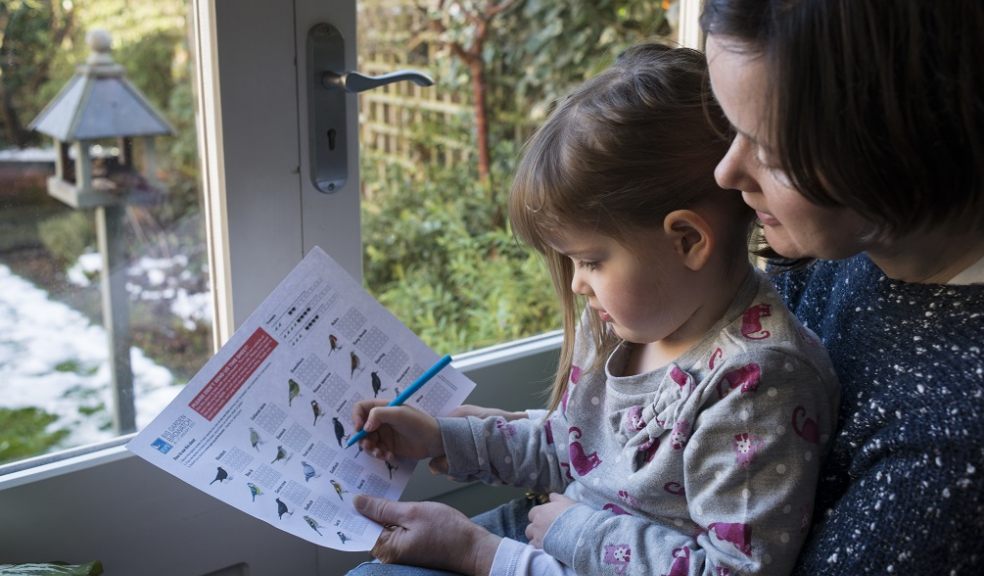
RSPB celebrates 40 years of counting garden birds in Exeter
The RSPB is celebrating a very special anniversary of its world famous Big Garden Birdwatch this weekend (26-28 January).
Just one hour every year, for the last 40 years, has made the RSPB’s Big Garden Birdwatch the largest garden wildlife citizen science project. During that time, hundreds of thousands of people have volunteered their time providing the RSPB with over 8 million hours of monitoring garden birds.
Over the last four decades, an astonishing 130 million birds have been counted giving the RSPB real insight into how our birds are faring.
This year’s event takes place on 26, 27 and 28 January 2019. The RSPB are asking people in Exeter to spend just one hour watching and recording the birds in their garden or local green space, then send their results to the RSPB. Around half-a-million people join in the Birdwatch every year.
Morwenna Alldis, spokesperson for RSPB Exeter, said: “Here in Exeter we’re lucky that many people are passionate about giving their local birds a home in their own gardens and greenspaces. From keeping bird feeders and bird baths topped up, to installing nestboxes, and even hand baking special birdie treats – people living in Exeter take pride in caring for their local wildlife. This weekend we want to encourage even more Exeter residents to spend just one hour counting the birds that are counting on them.
“The beauty of the Big Garden Birdwatch is that it’s so easy to take part and gives participants an instant connection to Devon’s nature. And crucially, the data you provide enables us to identify and help those species that are struggling the most.
“If you’re looking to make a positive difference this weekend – the Big Garden Birdwatch is the best thing you can do. It’s a guaranteed ‘feel-good’ experience for all ages and you don’t even need a garden to take part, your local greenspace or park is perfect too!”
For four decades, Big Garden Birdwatch has highlighted the winners and losers in the garden bird world. It was first to alert the RSPB to the decline in song thrush numbers. The song thrush was a firm fixture in the top 10 in 1979. By 2009, its numbers were less than half those recorded in 1979, plummeting to 20th in the rankings. [note 1]
To mark the event, the RSPB is encouraging Exeter participants to share their Big Garden Birdwatch stories. How will you #BigGardenBirdWatch? will showcase some of the best examples of how people take part from building their own birdwatching den, baking birdseed cakes and dressing up as Batman to see Robin.
Morwenna continued: “For this special 40th anniversary weekend we want to celebrate you and discover how you do your Big Garden Birdwatch in Exeter. Wherever you do your birdwatch, and whether this year will be your first time or your fortieth time – we’d love to hear from you. Share your stories and photos on Facebook/RSPBSW or Twitter @RSPBSouthWest – you may find yourself a star of our social media pages!”
Mike Clarke, RSPB Chief Executive, said: “Everyone has a role to play in saving nature and protecting our wildlife. Big Garden Birdwatch participants have made a significant contribution to monitoring garden bird numbers over the past four decades. Those taking part work together as part of a community with thousands of other Big Garden Birdwatchers to help the RSPB’s work to protect birds, other wildlife and the places they live.
“Reaching 40 years is a huge achievement and shows just how passionate people across the UK are about their wildlife. The survey started as a winter activity for our youth members. It’s now the largest garden wildlife survey in the world and appeals to both children and adults because it’s an enjoyable, easy, inclusive activity that anyone can do and a great opportunity to connect with nature.”
The survey has also shown the increases in collared dove and wood pigeon numbers and the alarming declines of the house sparrow and starling. While the overall decline in house sparrow numbers, reported by participants, since the Big Garden Birdwatch began is 57% (1979 – 2018), in the most recent decade (2009-2018) numbers appear to have increased by 17%. [note 3]
As well as counting birds, the RSPB is once again asking Exeter participants to log some of the other wildlife they have seen throughout the year. This year, people are being asked to look out for badger, fox, grey squirrel, red squirrel, muntjac deer, roe deer, frog and toad. [note 3]
To take part in the Big Garden Birdwatch 2019, watch the birds in your garden or local park for one hour at some point over the three days. Only count the birds that land, not those flying over. Tell us the highest number of each bird species you see at any one time – not the total you see in the hour.
Once you have recorded the birds that make a visit, submit your results online at www.rspb.org.uk/birdwatch
The parallel event, RSPB Big Schools’ Birdwatch takes place during the first half of spring term (2 January – 22 February 2019). More than 60,000 schoolchildren spent an hour in nature counting birds in 2018. Further information can be found at www.rspb.org.uk/schoolswatch















